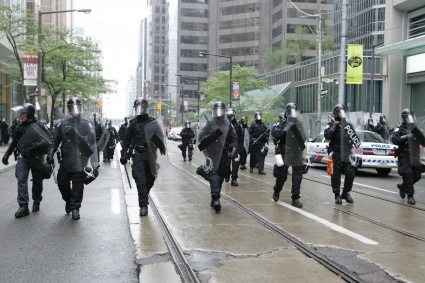July 1, 2010
Harper spends $1 billion on G20 security, previous G20 spend $18-$30 million

Despite Prime Minister Harper's assertions that the G20 leaders have agreed on measures to enhance the nascent global economic recovery, disagreements remain. At a press conference to wrap up the G20 Summit in Toronto, Mr. Harper tried to gloss over the disagreements between G20 leaders.
"The cohesion of the G20 was striking," Mr. Harper said at his closing press conference. "We're following different policies but with a single objective; to ensure growth and recovery in a durable and balanced way."
Germany's Chancellor Angela Merkel, French President Nicolas Sarkozy and Britain's Prime Minister David Cameron came to the G20 calling for fiscal restraint and a new levy on bank profits.
They got some agreement on deficits, but none on the banking tax, as countries such as Canada, Australia and India, that weren't as hard hit by the 2008 financial meltdown, flatly rejected a bank tax.
Mr. Harper began his remarks, at the press conference, by lauding the agreement the leaders had reached on deficits and debt reduction.
“We've agreed to reduce deficits by 50% by 2013 and to stabilize or reduce government debt-to-GDP ratios by 2016.”
With record deficits and debt-to-GDP ratios at record highs in most, if not all, of the G20 countries, Mr. Harper felt the need to reassure the world that the G20 leaders realize that, while this is a step in the right direction, it's not enough.
“These fiscal solutions are not an end in themselves, but they are “important down payments" on a framework for "strong, sustainable and balanced growth."
He then mentioned the U.K's budget deficit reduction program, China's willingness to allow more flexibility on the value of its currency, the RMB, and recent U.S. financial reforms, as examples of government policies that are already in accordance with the G20 leaders' plan for global economic recovery.
When questioned by a reporter about China's insistence that the value of its currency is a sovereign issue, Mr. Harper said China has made a commitment to revalue the RMB and he expects it to honor this commitment.
“China made a commitment to the world at this summit and I'm confident China will fulfill it. As you know, when you make commitments like this on the world stage, you will be held accountable for them.”
At a subsequent press conference, U.S. President Obama said China has determined that it's in its own interests to move back to the path of a flexible exchange rate, adding that an undervalued RMB has given China a trade advantage.
“We do expect that as more and more market forces come to bare, the RMB will go up and go up significantly. My expectation is they're going to be serious about the policy they themselves have announced.”
Although it allowed the RMB to appreciate to a five-year high before the summit, China has long insisted that it will not be bullied into revaluing its currency – out of concern for its dependence on an export-driven economy – and Mr. Harper had previously said China had insisted that a draft phrase, welcoming China's concession, be stripped out of the summit final statement.
Meanwhile, Mr. Harper said G20 leaders agreed to give Japan greater leeway on the agreed upon fiscal targets.
"Japanese debt levels while much, much higher than the rest of us are also entirely financed domestically, so there has been some recognition that Japan's targets may be slightly different," Mr. Harper said.
Notwithstanding the “greater flexibility” the G20 leaders accorded to Japan on deficit and debt-to-GDP ratios, Mr. Harper said G20 leaders still expect Japan to respect its commitments to effect the recovery.
He said that due to the damage to banking system, the recovery will be slow in the majority of countries, so the G20 needs to stimulate growth in developing countries, adding that some of these countries – China in particular – have developed stimulus programs of their own.
When questioned about the violence outside the Toronto Metro Convention centre, Mr. Harper said: “We obviously deplore the actions of a few thugs these summits attract around the world. That explains the security costs.”
I would like to have asked him why Canada's G20 security costs exceeded $1 billion, while security costs at the two previous G20 Summits in Pittsburgh and London were $18 million and $30 million respectively, but I was not allowed to ask a question.
Only reporters, who are part of a pool chosen by the Prime Minister's delegation, were allowed to ask questions and go to the bilateral meetings, between leaders throughout the summit.
On Saturday morning, I arrived at the media centre, only to find that although I had media accreditation, it only allowed me to attend the family photo op and the final press conference, and not much more.
As I was on my way to one of the leaders' meetings, Slyvain Gagne, Pool Coordinator, explained to me that Canada has a certain number of openings for reporters in the pool; and if I wanted to get accredited for the pool, I could contact the press gallery in Ottawa.
One has to wonder, firstly, what a reporter has to do to be approved by the Prime Minister's delegation; and, secondly, how many contentious questions a pool reporter can get away with asking before being excluded from future pools.
Photos by Miriam Kim, a freelance photojournalist








